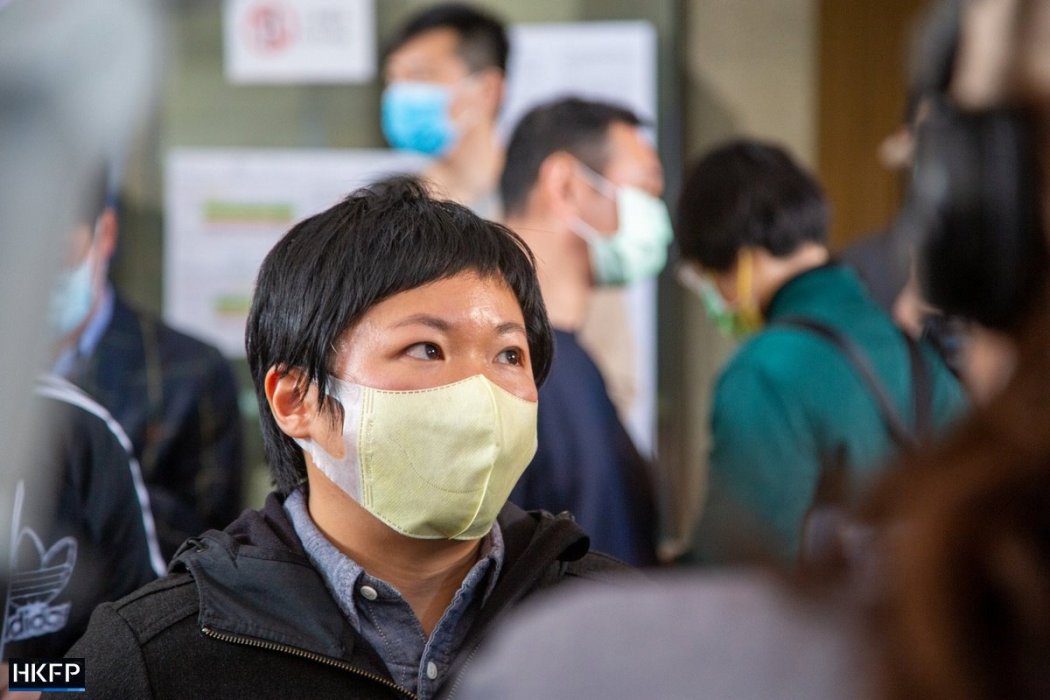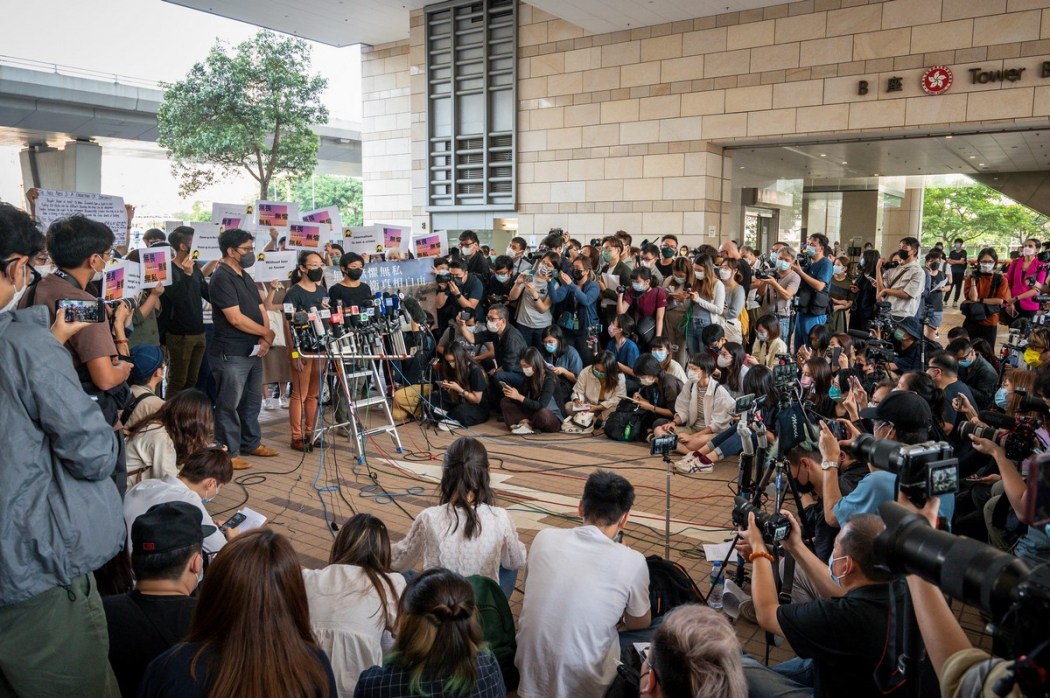Journalist Bao Choy felt mystified when police knocked on her apartment door one November afternoon last year, but within minutes of entering her home they announced her alleged crime. On July 13, 2020, an investigative documentary she had produced was aired, and the freelance television producer was suspected by police of making false statements to obtain a vehicle licence plate record while compiling the 23-minute programme.

The documentary made waves in Hong Kong by uncovering trails of evidence that identified suspected assailants of a 2019 Yuen Long mob attack, and revealed that police officers stood by as the attack unfolded. The documentary faces deletion from the internet by RTHK and the broadcaster has said it will refuse a Human Rights Press Award the episode won.
‘Guilty of reporting’
The act of using vehicle license plate records for news reporting was officially interpreted as criminal on April 22, when Choy was convicted. She pleaded “not guilty,” but was ultimately handed a HK$6,000 fine over two charges.
As Choy was escorted from her home by two police officers on the day of her arrest, the image of her squeezing between the officers in the police vehicle flashed before her eyes, “as if my soul left its body,” she told HKFP.

“What I saw at that time overlapped with the memory of when I was arrested by public security agents in mainland China when I was reporting there,” she said. “It felt unreal, because I had never imagined it… that this would happen in Hong Kong.”
‘Bao’ for Bun
The 37-year-old veteran journalist began her journalism career in 2007 at the government-owned, but editorially independent, RTHK. She joined the ranks of the civil service a few years later, enjoying a generous pay packet that most reporters would envy. She produced multiple television programmes including the award-winning Hong Kong Connection. In 2016, she left the broadcaster to join the crowdfunded investigative news start-up Factwire. But when Factwire struggled to stay afloat financially, she resigned and returned to Hong Kong Connection as a freelance producer in 2018.

Choy was affectionately nicknamed “Bao” by her peers, which literally means “bun” in Cantonese. The first two words of her real name, “Choy Yuk,” are homophones for “veggie pork” — so friends followed it with “bun,” to complete the term “veggie pork bun,” or “Choy Yuk Bao.” The nickname somewhat reflects her down-to-earth, approachable manner and her round cheeks.
While working on the episode entitled 7.21 Who Owns the Truth, Choy and three other producers meticulously pursued details captured by mobile phones or surveillance cameras to identify those who were amongst the Yuen Long mob attack assailants.
Using publicly-available vehicle license records — a common technique which, for years, was employed by crime and traffic beat reporters — Choy was led to a vehicle owner. Their car was seen transporting wooden rods to the location of the attack.
But using the government-published data for a news report amounted to “knowingly making a false statement,” a judge finally ruled last month. “The defendant not only used information on the Certificate of Particulars of Motor Vehicle to ‘identify’ the vehicle owner, she also used it for ‘reporting’ and ‘broadcasting,'” the judge’s reasoning read. “This is not the purpose she declared when she applied for the record online, which was ‘for transport and other related matters.'”

After her conviction, Choy was received by hundreds of supporters who greeted her with applause in front of the courthouse. “I think the verdict was not only against me, but against all reporters in Hong Kong,” she said at the time, wiping away tears.
The verdict was “quite extreme,” she told HKFP during an interview last Friday. “The judge used what I think is the harshest and narrowest perspective to interpret the law… it was not at all a lenient penalty to apply a fine of HK$3,000 [per charge], out of a maximum of HK$5,000.”

Although she was spared a prison term, “the [conviction’s] impact to the industry is immense, its significance is immense,” she said. Not being able to use public records for reporting is an additional hurdle to verifying information, but it also affects other industries relying on similar data, including those in auditing, compliance, or insurance.
Fragile freedoms
Although several local news outlets have stopped reporters from searching vehicle license records since her conviction, Choy said she did not see a reason to refrain from using other public records unless they are explicitly outlawed. The looming concern, however, remains the city’s national security law.

“I keep thinking about how they haven’t used the national security law to arrest reporters… reporters would more or less wonder whether their work would infringe upon the national security law’s ‘red lines’,” Choy said. “My case is only one of the illustrations under the grander scheme of the political situation – of the whole attack against press freedom.”
“What was within arm’s reach has gone beyond an arm’s length, and is moving further into the distance.”
Bao Choy
In retrospect, Choy said she felt civil rights like press freedom previously enjoyed in Hong Kong had been taken for granted and had not “taken root,” even though they were written into the city’s constitution, the Basic Law. “The freedoms we once enjoyed were not protected by clear laws or mechanisms, and were very fragile.”
“These things were granted [to us] within arm’s reach, as if they fell from the sky. But now that we are gradually losing them, we struggle to survive in the crevice,” she said. “During those beautiful times we were able to enjoy a breath of freedom, but it’s so easy for the regime to take these things from us and now here we are, feeling an intense pain, I would say.”
“What was within arm’s reach has gone beyond an arm’s length, and is moving further into the distance.”
Press freedom does not exist independently as a virtue for people to admire or respect, Choy said, but is supported behind the scenes by other aspects of society. Through her own experience, “I saw that in fact these were not really grounded on a foundation.”
Describing the formative decade she spent at RTHK, Choy said she was grateful she was able to operate with editorial freedom, “sheltered under the shade of a large tree.”

“What we saw as turbulent storms at the time were, in fact, only passing showers compared to what’s happening now,” she said of the massive editorial and management upheaval at RTHK. The public broadcaster took on a new director of broadcasting with no media experience in March. Ten TV episodes have since been censored and at least five senior executives have resigned.
Keep calm and carry on
“It’s no longer a place we recognise.” Bao said. “I’m a little bit glad that I was suspended from my job since November [as a result of the arrest.]”
After the verdict was handed down, Choy said she has resumed normal life to the best she could. “I went hiking afterwards to regain my peace of mind. Then, I just continued doing what I normally do – living my life, seeing my friends. I didn’t use much time to let it all settle,” she said. “I didn’t let it affect my life, no matter how bad it was.”

Now, Choy continues to report as a volunteer for a Facebook page that tracks court trials of protesters from the 2019 anti-extradition bill protests, while working as a producer to launch a news feature show on an entertainment platform owned by pro-democracy celebrity Chapman To.
“You don’t know what will happen next, so I spend my days grounded and in peace,” she said. “In a society like this, being able to live life as normal is a challenge in itself.”
Support HKFP | Policies & Ethics | Error/typo? | Contact Us | Newsletter | Transparency & Annual Report | Apps
Help safeguard press freedom & keep HKFP free for all readers by supporting our team

LATEST FROM HKFP
HKFP has an impartial stance, transparent funding, and balanced coverage guided by an Ethics Code and Corrections Policy.
Support press freedom & help us surpass 1,000 monthly Patrons: 100% independent, governed by an ethics code & not-for-profit.











